Whats a Parent to Do?
New Frontiers in Education
Edited by Dr. Frederick M. Hess
This Rowman & Littlefield series provides educational leaders, entrepreneurs, and researchers the opportunity to offer insights that stretch the boundaries of thinking on education. Educational entrepreneurs and leaders have too rarely shared their experiences and insights. Research has too often been characterized by impenetrable jargon. This series aims to foster volumes that can inform, educate, and inspire aspiring reformers and allow them to learn from the trials of some of todays most dynamic doers; provide researchers with a platform for explaining their work in language that allows policymakers and practitioners to take full advantage of its insights; and establish a launch pad for fresh ideas and hard-won experience. Whether an author is a prominent leader in education, a researcher, or an entrepreneur, the key criterion for inclusion in New Frontiers in Education is a willingness to challenge conventional wisdom and pat answers. The series editor, Frederick M. Hess, is the director of education policy studies at the American Enterprise Institute and can be reached at or (202) 8286030.
Titles in Series
Choosing Excellence in Public Schools: Where Theres a Will, Theres a Way, David W. Hornbeck and Katherine Conner (2009)
Its the Classroom, Stupid: A Plan to Save Americas Schoolchildren, Kalman R. Hettleman (2010)
Social Entrepreneurship in Education: Private Ventures for the Public Good, Michael R. Sandler (2010)
Standing and Delivering: What the Movie Didnt Tell, Henry Gradillas and Jerry Jesness (2010)
Taking Measure of Charter Schools: Better Assessments, Better Policymaking, Better Schools, Julian R. Betts and Paul T. Hill (2010)
Working for Kids: Educational Leadership as Inquiry and Invention, James H. Lytle (2010)
From Family Collapse to Americas Decline: The Educational, Economic, and Social Costs of Family Fragmentation, Mitch Pearlstein (2011)
Teaching America: The Case for Civic Education, David J. Feith (2011)
The Urban School System of the Future: Applying the Principles and Lessons of Chartering, Andy Smarick (2012)
Blueprint for School System Transformation: A Vision for Comprehensive Reform in Milwaukee and Beyond, Frederick Hess and Carolyn Sattin-Bajaj (2013)
Breaking the Cycle: How Schools Can Overcome Urban Challenges, Nancy Brown Diggs (2013)
Trendsetting Charter Schools: Raising the Bar for Civic Education, Gary J. Schmitt and Cheryl Miller (2015)
Whats A Parent to Do?: How to Help Your Child Select the Right College, Anne D. Neal (2017)
Published by Rowman & Littlefield
A wholly owned subsidiary of The Rowman & Littlefield Publishing Group, Inc.
4501 Forbes Boulevard, Suite 200, Lanham, Maryland 20706
www.rowman.com
Unit A, Whitacre Mews, 26-34 Stannary Street, London SE11 4AB
Copyright 2017 by Anne D. Neal
All rights reserved. No part of this book may be reproduced in any form or by any electronic or mechanical means, including information storage and retrieval systems, without written permission from the publisher, except by a reviewer who may quote passages in a review.
British Library Cataloguing in Publication Information Available
Library of Congress Cataloging-in-Publication Data
978-1-4758-0881-0 (cloth : alk. paper)
978-1-4758-0882-7 (pbk. : alk. paper)
978-1-4758-0883-4 (electronic)
 The paper used in this publication meets the minimum requirements of American National Standard for Information SciencesPermanence of Paper for Printed Library Materials, ANSI/NISO Z39.481992.
The paper used in this publication meets the minimum requirements of American National Standard for Information SciencesPermanence of Paper for Printed Library Materials, ANSI/NISO Z39.481992.
Printed in the United States of America
Foreword
There is no American system of higher education. Colleges and universities are abundant and varied, from enormous state institutions to tiny Christian colleges, from two-year art colleges to universities offering undergraduate, postgraduate, and professional degrees in multiple combinations and in every subject under the sun.
Its a free marketbut one with more than a few oddities and even some minefields. There is no consensus about what should count as quality and value, or how to measure them. Nonetheless, as in any free market, those with the most information are in the best position to make good choices.
Its hard to know what to look for, and hard to know whether youve found it. This book will help you evaluate the providers of higher education.
Most colleges and universities are public charities even though they charge high prices for their services. But somewhere deep in the DNA of every not-for-profit college and university is a ghostly trace of its charitable and civic roots. Colleges and universities pay at least lip serviceand in some cases, much more than thatto the idea that the public good and the development of wise and principled graduates are at the essence of their ancestry and purpose.
Yet, when not-for-profit colleges and universities compete for customers, their marketing efforts collide jarringly with their aspirations for social and moral purpose. A wise parent or prospective student will read between the lines to figure out what isnt being said. Beneath the boast Ten swimming pools, and a rock climbing wall may lurk the reality Our gymnasium is more challenging than most of our courses! And the picture of our diverse student body? It could well be digitally edited to get them together in one place!
This book will help you pry the truth out from the imagery. It will help you ask the right questions and it will make you think about what you want to do with the answers, which are rarely simply right or wrong. It will point you to other reliable sources of information.
More than anything, Whats a Parent to Do? will make you healthily skeptical without being cynical. Though sanctimony is commonplace in higher education, genuine piety is there too, if you know how to look for it.
Good luck on your search for a great education!
Harry R. Lewis
Gordon McKay Professor of Computer Science
Former Dean of Harvard College and Interim Dean
of the Harvard John A. Paulson School of
Engineering and Applied Sciences
Preface
WHATS A PARENT TO DO?
Thats certainly a question I asked myself in the course of my daughters college-application process.
And I know I am not alone. Ive spent more than two decades in higher education, first at the National Endowment for the Humanities and then at the American Council of Trustees and Alumni, working with alumni and trustees around the country to improve higher education. And in those years Ive seen many changesincluding those that make the college-selection process more fraught than ever.
Each year, well over a million newly minted high school graduates enroll in colleges and universities across the country.
For decades, parents and students assumed that all the stress and anxiety were worth the payoff. A college degree was a guarantee of a good job. It was part of growing up, a way of making contacts, and even meeting a spouse. Getting a college degree was the essence of the American dream.
Those assumptions are changing. In the past few years, there has been troubling news of declining standards, political correctness, and spiraling costs. Tuition sticker prices have gone up over 570 percent since 1982, and to no ones surprise, student debt has risen as well.

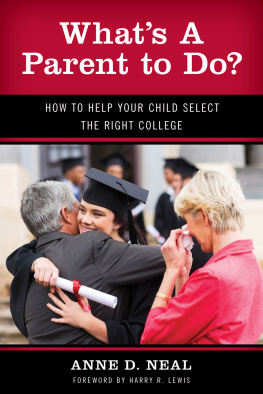
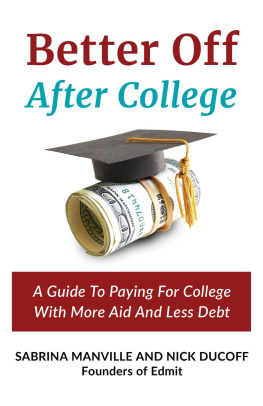
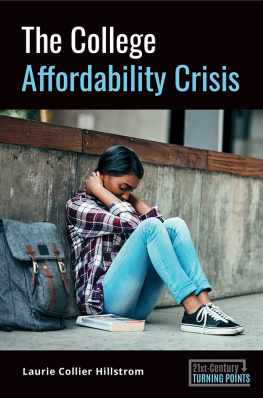
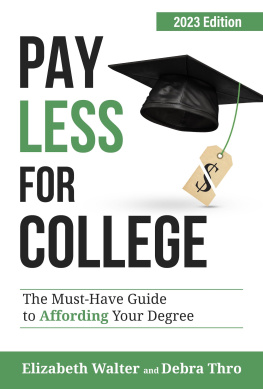

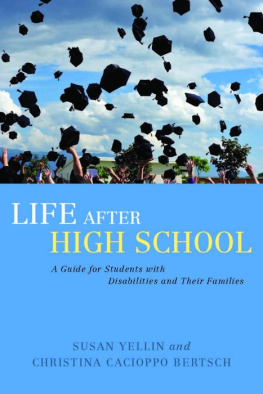
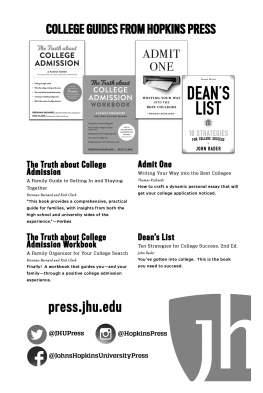


 The paper used in this publication meets the minimum requirements of American National Standard for Information SciencesPermanence of Paper for Printed Library Materials, ANSI/NISO Z39.481992.
The paper used in this publication meets the minimum requirements of American National Standard for Information SciencesPermanence of Paper for Printed Library Materials, ANSI/NISO Z39.481992.